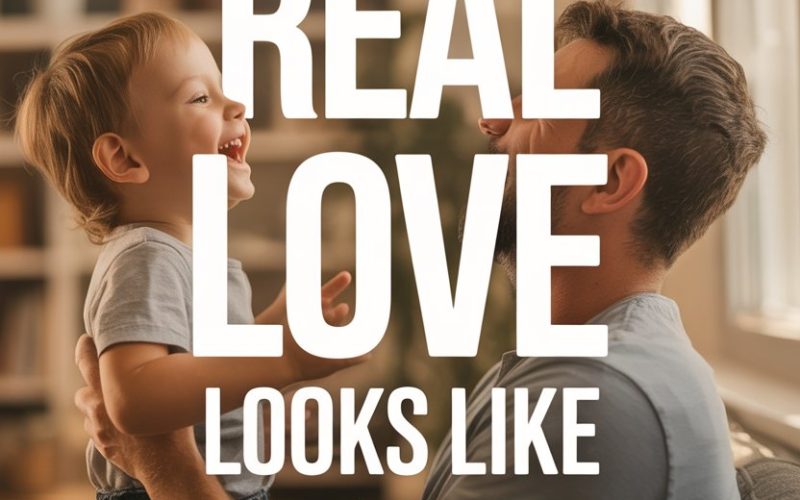You know those moments when your child throws you the kind of side-eye usually reserved for soap opera villains? Or how they morph into a pint-sized philosopher just as you’re trying to leave the house?
Kids have a knack for keeping us on our toes, particularly when it comes to love.
Ask any parent what they want most for their child and “feeling loved” usually tops the list, just above “not eating crayons” and “please, just one quiet trip to the loo.”
Yet, what real love actually looks like through a child’s eyes is often a little different from what parents expect.
Love Is Spelled T-I-M-E
It doesn’t matter if you’re a working parent, a stay-at-home dad, or somewhere in between—your actual presence is pure gold to your child.
University of Illinois research on parent-child bonding found kids measure love less by grand gestures and more by everyday togetherness.
Think about it: that ten-minute bedtime chat? The world’s worst tea party with a plastic cup? To a child, those moments are practically poetry.
When you give your full attention (and silence your phone—yes, even that group chat about bin day drama), your child sees you choosing them over everything else competing for your focus.
Reliability Feels Like Love
Promises are sacred when you’re little. Tell your child you’ll be at their school play? They will scan the crowd for your face with the intensity of a MI5 agent.
Consistency—showing up, doing what you say, making routines stick—signals to kids that love means “I can count on you.”
Parents aren’t machines; things go pear-shaped. When they do, honesty goes a long way. “I know I said I’d be there, but my car broke down. I wish I could have made it—I love you and I’m sorry.”
Hearing this helps kids build trust, even when things don’t go as planned.
Listening With Your Whole Self
Many parents can recite the schedule of Paw Patrol off by heart, but truly listening is a different beast. Kids notice when you’re half-listening while planning dinner or pondering if you locked the back door.
Genuine listening means meeting your child’s gaze, asking questions, and letting them finish without jumping in with “helpful” solutions.
Child development experts, like those at the Center on the Developing Child at Harvard, have found that children who feel heard and validated show stronger self-esteem and resilience.
You don’t have to agree with their theory that the vacuum is a sleeping robot, but you can make their story feel important.
Boundaries That Say I Care
Nobody loves being the bad cop. But boundaries (yes, those bedtime limits and broccoli negotiations) are a huge part of how kids experience love.
Structure gives children the sense that someone cares enough to keep them safe—even when it makes you wildly unpopular at half past eight.
Firm, fair boundaries help kids understand that love isn’t just warm and fuzzy; it’s also about guiding, protecting, and sometimes saying “no” (even when it’s easier to give in).
Affection in All the Right Doses
Every child is a unique little puzzle when it comes to affection. Some want to be snuggled like a koala, others are happy with a high-five or a silly handshake. What matters is meeting them on their terms.
Physical closeness, from a quick side-hug to sitting together watching Bluey, releases oxytocin, which researchers call the “bonding hormone” for good reason.
Paying attention to what kind of affection your child prefers shows them you value their comfort and boundaries.
Speaking Their Love Language (Yes, Kids Have Them Too)
You may have heard of the “Five Love Languages” for grownups, but kids have preferences too. Some children light up when you praise them; others would rather build a blanket fort with you than get a compliment.
The trick? Notice what lights up your child—do they ask for help, give you drawings, or want to hang out quietly?
If you’re curious, child psychologist Dr. Gary Chapman’s book on children’s love languages is surprisingly helpful (no, this isn’t sponsored—just a genuinely handy resource).
Letting Them Mess Up—Without Withdrawing Affection
Kids are Olympic-level mistake-makers. They spill, shout, sneak biscuits, forget to feed the goldfish, and sometimes say things that would make a sailor blush.
Real love means holding the boundary (“we don’t call people ‘poo-head’”) while showing you still care, no matter what.
One of the strongest predictors of emotional security, according to a study from the University of Delaware, is knowing your parent’s love doesn’t dry up when you mess up.
That doesn’t mean letting everything slide—just that forgiveness and affection are always in stock.
Seeing Who They Really Are (Not Who You Hoped They’d Be)
Nothing melts a heart like seeing your child truly—whether they’re the class clown, the quiet observer, or the proud owner of 37 mismatched socks.
Love gets real when you let your child’s quirks, dreams, and opinions shine, even when they don’t match your own.
It’s tempting to guide them toward your own interests (wouldn’t life be easier if they loved football as much as you do?).
But when you show delight in their passions—dancing, dinosaurs, collecting cardboard tubes—they get the message: “I’m loved for me, not for ticking boxes.”
Apologies That Actually Mean Something
We all lose our cool. Sometimes, “indoor voices” are about as common as unicorns.
When you snap, shout, or accidentally ruin their latest LEGO masterpiece with a misplaced foot, a real apology works wonders.
“I shouldn’t have shouted. That must have felt scary. I’m sorry.”
Not only does this keep your connection intact, it models humility and teaches your child nobody’s perfect (not even grownups who buy the wrong kind of crackers).
Supporting Their Independence
Every time your child insists on “doing it myself,” it’s a request for both trust and love. Standing back while they attempt to zip their jacket or pour their own juice (mess alert) says, “I believe in you.”
This support builds confidence. According to the American Academy of Pediatrics, encouraging independence is a strong sign of parental love, even if it means your mornings run on chaos and crumbs.
Celebrating the Ordinary
Real love isn’t always Instagrammable. Sometimes it’s sitting through a five-minute joke with no punchline, or listening to a passionate monologue about slugs.
Recognising the little achievements—a shoe tied, a drawing finished, a shy smile—plants seeds of self-worth.
You don’t need a banner or balloon arch for every milestone. A wink, a grin, a “look at you!” on a Tuesday afternoon, quietly says, “I see you, and I’m proud.”
Staying Patient When It’s Hard (and When You Fail)
Parenting is not for the faint-hearted. You’re juggling work, laundry, and requests for water after bedtime.
You won’t always respond with patience or wisdom. That’s human.
What matters is the willingness to come back, try again, and show your love even after tough moments. Children don’t need perfection—they need to know that even when things fall apart (sometimes literally), your love is steady.
When Love Looks Like a Messy Kitchen
If you’re worried about fancy experiences, don’t be. Most kids are more likely to remember a rainy afternoon spent baking—or the time you let them pour the flour and regretted it immediately—than any trip to Disneyland.
Real love is lived out in these small, sticky, ordinary moments. The ones that feel unremarkable until you realise your child’s idea of “parental greatness” is just you, being there, leaning in, and caring in your own wonderfully flawed way.
More Than Enough
Your child doesn’t need a superhero—they need you. With your quirks, your patience (or lack thereof), your bedtime stories, and even your awkward dance moves at birthday parties.
If you’re wondering what real love looks like to your child, odds are you’re already doing it—between the lines, in the eye rolls, in the bedtime kisses, and those moments of saying “I’m sorry” when you wish you’d handled it better.
Because to your child, love isn’t a grand gesture. It’s you, showing up—even when you’re running on empty and your coffee’s gone cold.
And that’s more than enough.




